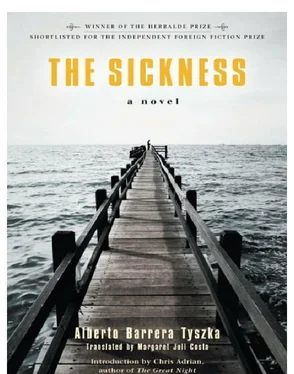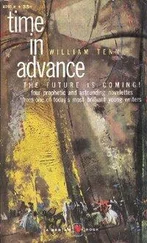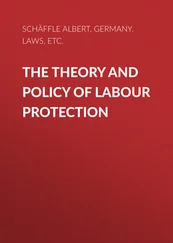“Good morning. My name’s Roger Picón Heredia and I want to welcome you all to the first session of this new workshop.”
He’s a tall, dark, well-built man, although he moves with great agility, as if he weighed nothing. He doesn’t have to try very hard to make people like him. He has a natural charm and a brilliant smile. While he talks, he walks among the participants, looking at each person and smiling at them.
“Before we start,” he says, “I want you all to get rid of those resigned expressions, as if you’d been forced to come here, as if this were a club for the sad and the hopeless. Well, it’s not. On the contrary. Make no mistake, this workshop may be called ‘Learning to die,’ but it’s not an undertaker’s. We come here to learn and to value how wonderful our life has been and still is. That’s why you’re here. Because you still want to squeeze a bit more out of your life and to celebrate it. Okay, everyone on their feet. That’s right, everyone. We’re all going to stand up. Now hold hands. That’s it. Ready? Okay.”
At this point, Merny wishes she had waited outside in the street. Now she’s hand-in-hand with old Señor Miranda and the very thin, very pale young man. The young man’s hand is sweating. The old man’s hand is cold. It suddenly occurs to her that the young man might have some terrible, contagious disease. She immediately lets go of his hand. The young man looks at her, and Merny, embarrassed, takes his hand again.
“How are you feeling?” The leader of the group walks slowly past them all. He stops next to Merny. “Are you feeling nervous?”
“A bit,” she whispers awkwardly.
“Don’t worry. Nothing bad is going to happen.”
Then he moves on. Merny feels a slight pressure on her right hand. She assumes it was an involuntary movement, but then Javier Miranda’s hand sends her another signal, another brief squeeze. She looks at him. He’s smiling mischievously at her, as if the whole situation were highly amusing, as if he were a child in need of someone to share the joke with.
“Now close your eyes. Breathe deeply. That’s it. One, two. One, two. And again. Very gently. Excellent. Now I want you to go on a journey into your memory and visit all those wonderful places and wonderful moments you’ve known. Moments of love, joy, triumph. With your loved ones, with your family, with your friends. Keep your eyes closed and experience those moments again. Keep breathing deeply. One, two. And now, say with me: I’m alive.”
The group finds it hard to get in the mood. They shoot sidelong glances at each other, uncertain what to do. They don’t so much follow the facilitator’s instructions as trail reluctantly after them.
“No, not like that. No one’s going to believe you if you say it like that. Come on, loudly: I’m alive!” The man moves round the circle, touching them, patting them on the back, encouraging them. “Come on! I’m alive!” He reaches Javier Miranda, puts his arm around him and says: “Come on, maestro! Louder. I’m alive!”
Until, finally, they manage to form an enthusiastic, or at least reasonably enthusiastic, chorus. Merny is reminded of the evangelical Christians who live in her barrio. They shout too. They hold hands and shout. And sing. They don’t smoke or drink, which is good, but the women aren’t allowed to wear trousers. And that’s bad. Merny feels the very thin, very pale young man’s hand growing sweatier.
“Now say with me. I’m alive. And my life has been good. When I think about my life, about what I am, only one word comes into my mind: thank you. Yes. Thank you. Because my life is a miracle. Because my life is a gift. Thank you. Thank you, life.”
They all rhythmically repeat the same words. Then they sit for a few seconds in silence. They’re all waiting for the facilitator to say something, to tell them what to do next. They don’t dare open their eyes. Javier Miranda starts to think that the workshop is a bit of a con, a small circus for those wounded in combat, for those who cannot return to the battlefield. And so they’re offered several sessions with this determinedly cheerful preacher, intent on convincing them that you can also be joyful in defeat.
“Right, you can open your eyes now,” the man says at last.
And he again welcomes them back with a smile. He asks them all how they feel. He makes them see that they’re feeling better, that this exercise has given them a new glow, that their initial mood of despondency has lifted. Then he makes them all say their name out loud. Just their name. Merny is terrified. She’s never done anything like this before. She’s never had to tell so many people her name. When her turn comes, she hesitates, she almost feels as if the word will lose its way in her throat, that when she tries to say it, her name will run away, will get lost inside her body. Then she discovers that it’s all much easier than she thought. She says “Merny.” Out loud. And then she experiences a sense of relief. And pride. Yes, when she says her name and finds that nothing terrible happens, that she’s alright, that her name is just as much a name as anyone else’s, Merny feels pride, a strange peace, the satisfaction of having passed a test.
“Why are we here? Each of you has a very personal reason for being here. It may be that the reason is a cause of shame or sadness to you. You feel weak, vulnerable. You’re afraid. Do you know what? You’re not alone. No, you’re not the only ones. Look around. There are men and women here, young and old. There are white people, brown people, black people. We none of us look very alike. You probably didn’t even know each other until today. And yet I’m sure that at the moment you’re all experiencing more or less the same emotions. And I’m going to tell you something. A lot of people wouldn’t even dare come to this workshop. I mean it. Even the name frightens them. People just like you, who feel the same, but who have allowed themselves to become frozen, who have closed the door on their life and given up. But you haven’t, you’ve taken the risk, you did it, you’re here, at the first session of a workshop called ‘Learning to die.’ That’s why I’m applauding. I’m applauding you. I mean it. Because I’m really excited to see you here. Because you’re amazing and I congratulate you.”
They take the bus back to the apartment. Javier Miranda doesn’t want to go on the subway. He prefers to be above ground so that he can see the city. It’s midday, the sky is intensely blue and clear and the sun, high up, is like a white stone. They manage to get a seat and sit down next to each other. Merny says nothing. She only speaks when he asks:
“So what did you think of it?”
“Odd.”
“In a good way or a bad way?”
“I don’t know, just odd.”
He looks at her and smiles. And she smiles too.
She doesn’t even reread the e-mails now, she knows them by heart. She has read them so often that she might even be able to recite them. She doesn’t need to look at them. At some point, a transition, a journey took place, and the words of Ernesto Durán stopped being something outside her, on the computer screen or printed on a piece of paper, and became something that lives and breathes inside her. She has even found herself counting adjectives. There are so few. More than once, she has been surprised by the memory of a particular phrase, for example: “There was a ravine inside my body.” Karina takes a worryingly short time to mentally locate that sentence in the first few lines of the fifth paragraph of the third letter sent by Durán on June 12 at 6:24 in the evening.
She hears a report on the radio about people who are setting up a strange society, the National Patients’ Union. They want to form a kind of trade union where people can defend themselves against doctors, protect themselves from medicine. It immediately occurs to Karina that Ernesto Durán is likely to be involved, that he’s probably one of the leaders of this infant organization. She tries to listen as closely as possible to the item. That same night, on television, she sees an interview with some of the people behind the movement. The first to speak is a lady who describes how she was bitten on the arm by some strange creature, which she assumed was an insect, although she didn’t know which kind. It wasn’t any common-or-garden variety, not a mosquito or a gnat or a midge. It was something else, she says. Anyway, her arm started to swell up and turn purple and she had no option but to go to the emergency room. She was seen by the doctor on duty, who — according to her — merely poked around in her inflamed arm with a syringe. He didn’t ask her anything, or say anything, or give any explanations. Karina guesses that the woman is telling the truth because, even now, when she recalls the moment, she grows angry and finds it hard to get the words out, she seems about to weep with rage. When the doctor finally grew tired of scraping around beneath her skin, he said that he’d found nothing, left her under observation for two hours and then gave her an antibiotic, explaining that the antibiotic wasn’t for the bite, but for what he’d been doing with that wretched syringe. “Don’t worry about the bite,” the doctor said. “It’s nothing. It’ll clear up in time.” She paid a small fortune and went home with an idea jumping about inside her head: a National Patients’ Union.
Читать дальше












